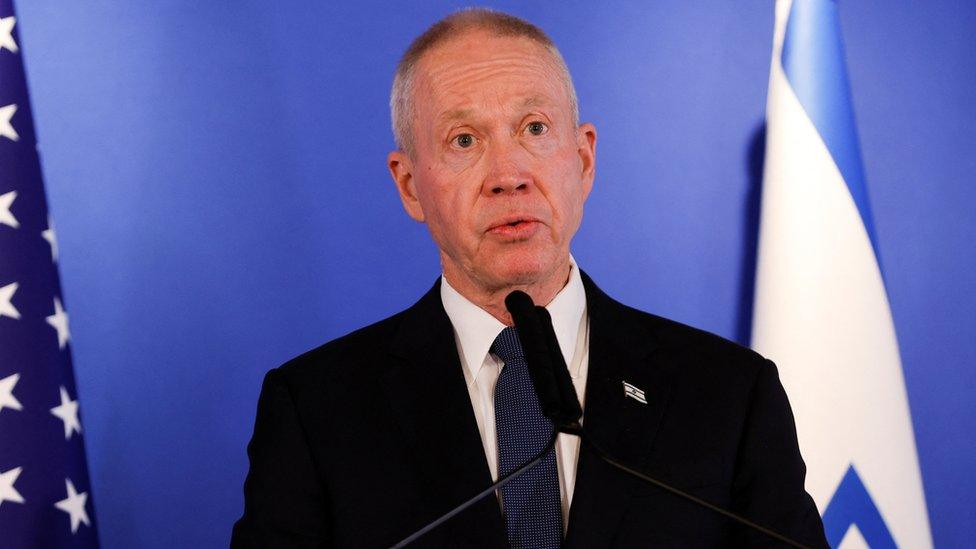Israeli Arabs torn over judicial reforms protest movement
- Published
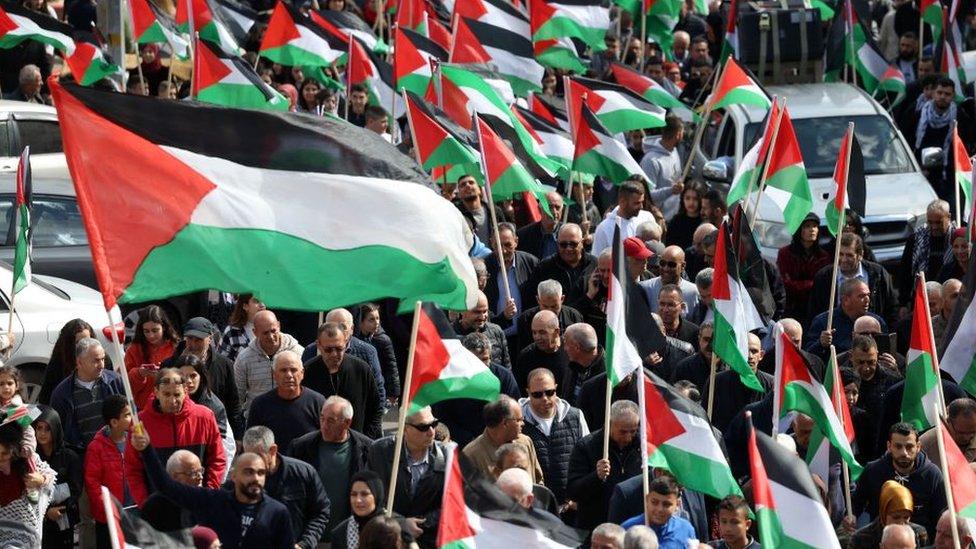
Land Day protests have become a way of highlighting the condition of Israeli Arabs
At a recent march for Land Day, Jameel Saed denounced the nationwide protests against controversial judicial reform plans that have convulsed Israel since the start of the year.
"I didn't participate in any and I'm not going to. I don't think that many Palestinians did," said the student from the Arab city of Nazareth, in northern Israel.
"The Israeli protests are calling to get the status quo back - to 'claim back democracy'. But we don't think that it was anything but tyranny and apartheid.
"This is not something that we want."
Jameel is one of Israel's approximately two million Israeli Arabs. Israeli Arabs are Palestinians and their descendants who remained in the land which became Israel in 1948. They comprise about 20% of Israel's population. While they are officially citizens of Israel, many - estimates and polls vary - self-identify as Palestinians.
Hundreds of thousands of demonstrators have been on Israel's streets weekly. They have been demonstrating against the right-wing government's proposed reforms that would radically increase its control of Supreme Court appointments and decisions.
In the face of the uproar in Israel's towns and cities, Prime Minister Benjamin Netanyahu's coalition has now put the reforms on hold at least until the Israeli parliament, the Knesset, returns from recess on 30 April.
Jameel believes that the march at Land Day - the annual commemoration of the Israeli army killings in 1976 of six Palestinians demonstrating over Israeli expropriation of their land - is more important for Palestinian rights than participation in the current mass protests.
On the march in the Israeli Arab town of Sakhnin, where some of the killings took place, he questioned the apparent disparity in treatment by Israeli security forces of Israeli and Palestinian protests.
"If we did one quarter of what the Israelis are doing we would've been killed by now," he said.
Sense of exclusion
Of the demonstrations that have taken place, involvement by Israel's Arab citizens has been low and primarily in Israeli Arab areas in the north.
Some are happy to see the judicial crisis play out, or think it is the logical outcome of a state and system which many feel has always excluded their community from full democratic treatment.
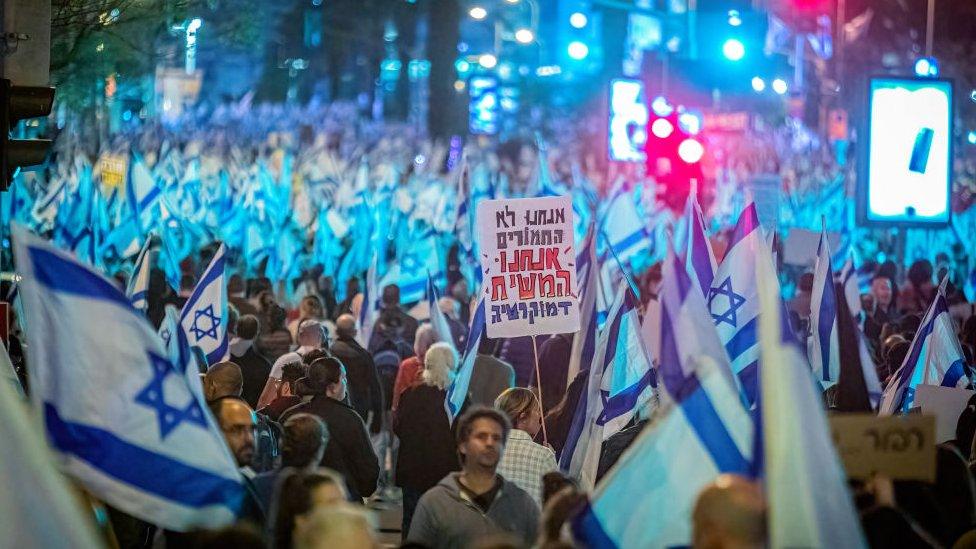
Israel has seen weeks of its biggest ever anti-government protests
Many argue that past Supreme Court decisions which have discriminated against Palestinians, both in Israel and in the Occupied Territories, provide no impetus to defend it. For instance, upholding the 2018 nation state law that stated that in Israel the right to self-determination is unique to Jewish people.
More recently, the court approved the eviction of 1,000 Palestinians from an area in the occupied West Bank so that Israel's army can use it as a training zone. UN human rights experts warned that the move - without military necessity in an occupied territory - could constitute a war crime.
After a string of inconclusive elections in Israel, and the fall of a short-lived broad spectrum coalition government, November's polls saw Mr Netanyahu propelled back into power at the head of the most right-wing government in Israel's history.
With a coalition of nationalist and religious parties in charge, many Palestinians in Israel and the Occupied Territories feel at risk of its legislative, cultural and political might.
Two of the most prominent ministers in the coalition - Finance Minister Bezalel Smotrich and National Security Minister Itamar Ben-Gvir - are themselves settlers in the West Bank.
Last month, Mr Smotrich provoked a storm of angry reaction when he said that there was "no such thing" as a Palestinian people.
Analysts in Israeli media have speculated that the coalition will try to remove legal constraints to annex some or all of the West Bank. If such a move were to happen, it would likely see the absorption or expulsion of Palestinians.
'We're not alone'
Calls from Jewish Israelis for Palestinian rights, the occupation and peace to be part of the protest dialogue have been met by the demonstrations' mainstream with indifference or the argument that they need to remain focused on their own issues to achieve success.
But, despite the current context, some Israeli Arabs are pushing for greater engagement in the Israeli protests.
At the Land Day march, Aida Touma-Suleiman, an Arab member of the Knesset, said: "Some are joining, but not as much as expected from those who are going to be hurt the most from these reforms.
"Those who are politicised like us, we are trying to push to get our voices heard, either by meeting with those who are leading the demonstrations or taking part in the demonstrations under the anti-occupation bloc."
This bloc is increasingly seen at the larger protests, such as those in Tel Aviv and Jerusalem, waving Palestinian flags and chanting slogans in Hebrew and Arabic. Though it remains tiny in comparison to the total number of protesters.
Some Israeli Arabs see the protests as an opportunity to advance their demands for equality.
"We are saying that real democracy cannot exist with the ongoing occupation of another people - the Palestinian people - and that real democracy cannot be discriminatory against the Palestinian citizens of Israel," said Yousef Jabareen, an Arab former member of the Knesset and law lecturer.
"There's a need to advocate for other initiatives to promote real democracy."
This includes working with Jewish Israelis.
At the first Saturday protest in Tel Aviv during the Knesset's recess, Alon-Lee Green was among a group of purple-shirted protesters huddling together in the Mediterranean sunshine.
Mr Green is the national co-director of Standing Together, a grassroots movement that aims to bring Jews and Palestinians in Israel together to achieve peace and equality.
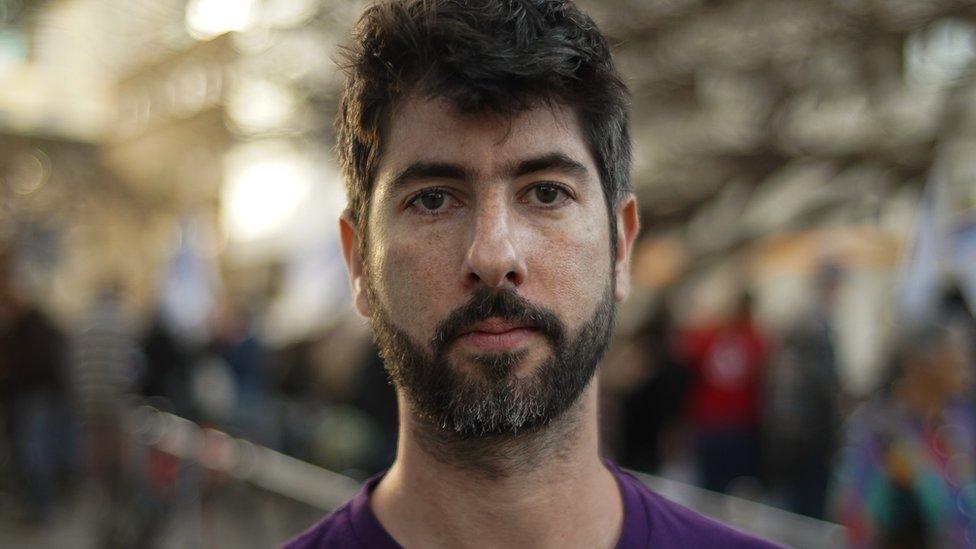
Alon-Lee Green is a leader of a Jewish-Arab grass roots movement
He said that carving out space for their voice has been difficult, but is increasingly possible.
"There is a big argument within the protest [over including calls for Palestinian rights]," he said.
He said a large part of the public did not want to bring in the topics of occupation or social justice at the protests. But while the Israeli flag was seen everywhere, people were now able to wave Palestinian flags freely, Mr Green added.
Previously there were "a lot of attacks, even violent attacks on people that were holding the Palestinian flag inside those protests," he said.
Ibrahim Abu Ahmad, who works for a non-governmental organisation, is one of the handful of Israeli Arabs who has spoken at the Israeli rallies.
On the sidelines of the Saturday protest, the 30-year-old said that the desire for immediate, full Palestinian rights and a Palestinian state was unrealistic - rather that small steps were needed.
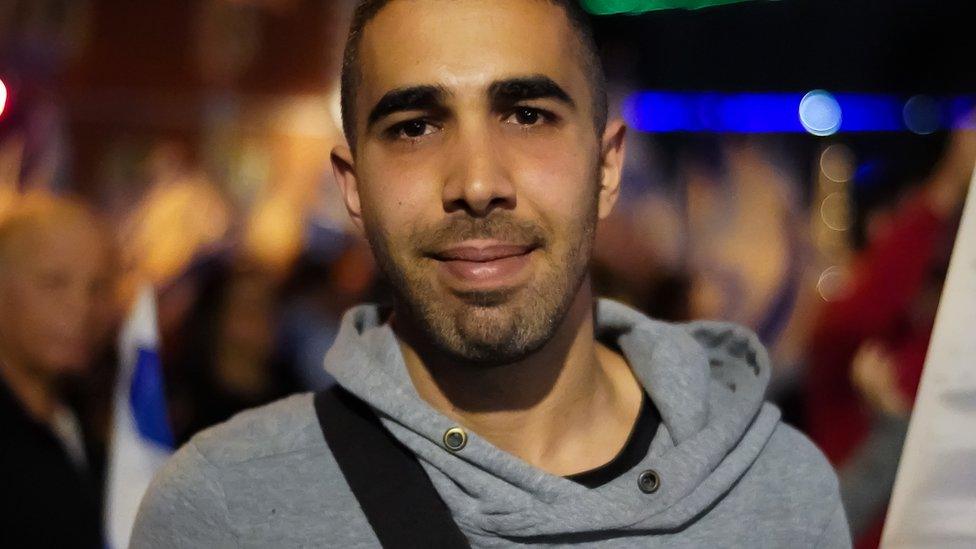
Ibrahim Abu Ahmad: "We should be kicking the door"
He favoured first building networks in Israel and strengthening Palestinians' social and political role.
"We have an ally in this Israeli society, we're not alone, there are people who believe in this change," Mr Abu Ahmad said. "We should take it as an opportunity to put them on our side. And not to alienate ourselves from everything."
"Then after the crisis is resolved we can say: 'We stood by you. Now it's time to discuss our issues.'"
Mr Abu Ahmad added Palestinians "shouldn't be waiting for permission" to put their views forward.
"We should be kicking the door," he said.
Related topics
- Published29 March 2023
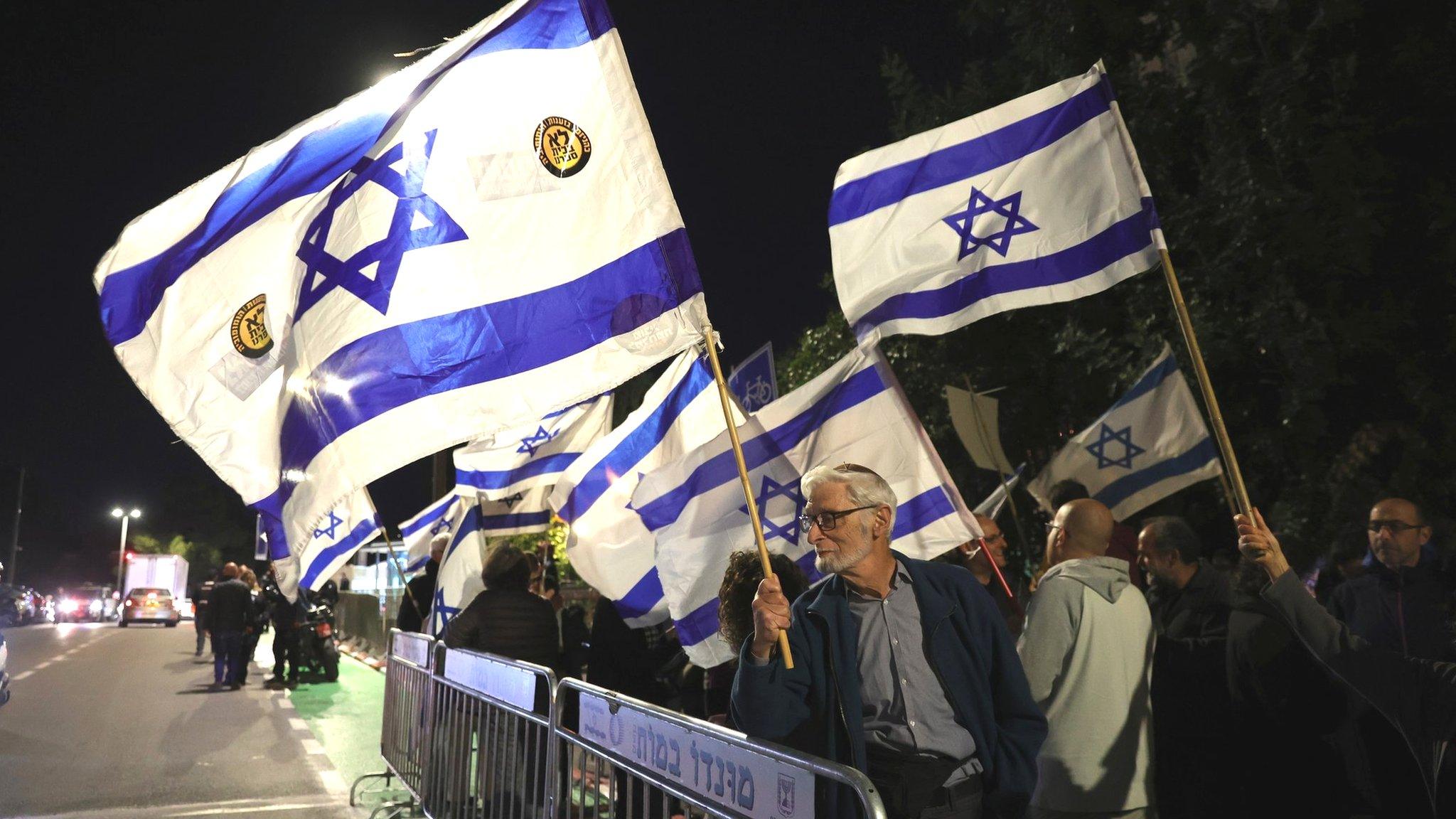
- Published27 March 2023
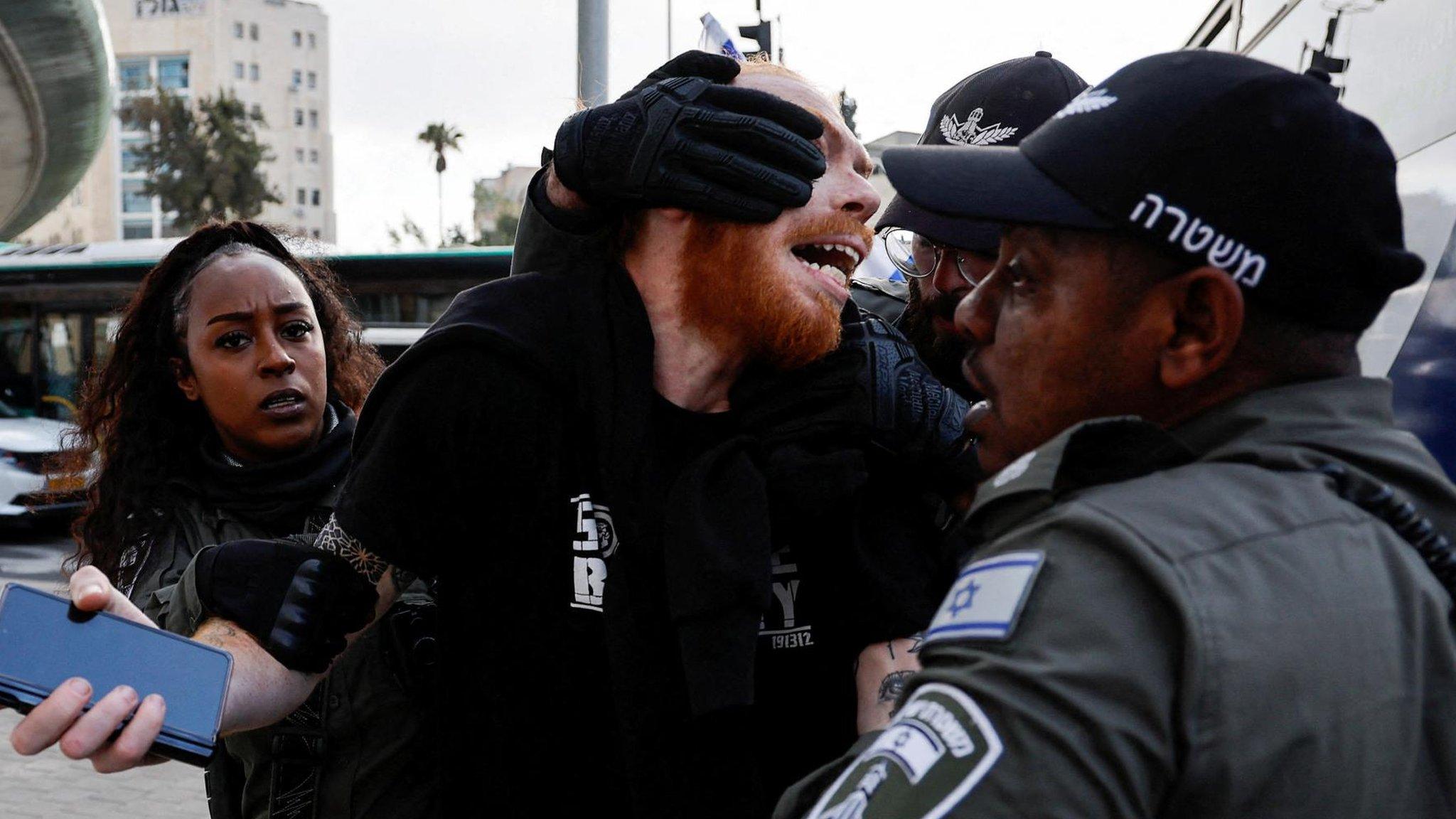
- Published27 March 2023
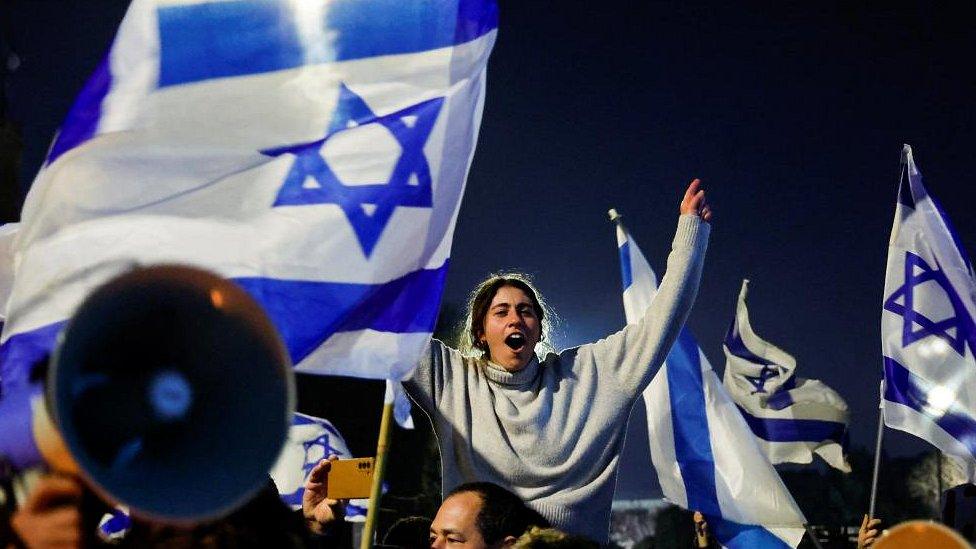
- Published27 March 2023
